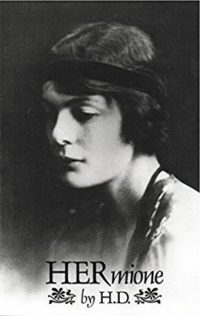I am swing-swing between worlds, people, things
 HERmione
HERmione
by Hilda “HD” Doolittle
I’ve delayed writing this review because I really didn’t know how to describe this book. It’s a strange, repeating, myth-referencing auto-fiction about a young woman. The strangeness and repetition point to the main character’s emotional fragility, but they also reflect her wider character – an intelligent woman well-versed in arts and sciences who can quickly get lost in thoughts and dreams.
It’s the fictionalised memoir of a year in Hilda Doolittle’s youth, 1907–08, when she was 21. She wrote this in 1927 and at the time of her death in 1961 was preparing it for publication, but it then got packed away with all her literary estate and didn’t finally see publication until 1981. This may or may not be related to the bisexual nature of both the author and her fictionalised counterpart.
The story takes a bit of teasing out from the abstract prose, and it helps to learn about HD’s own life to fully follow it (in my copy there is an introduction by HD’s daughter that fills in some gaps), but the actual events aren’t really what’s important here. HD has done an incredible job of finding the words to depict fragile mental health.
“There are of course bits of colour to be thrown down like counters in a banking house, or chips across a poker table. All your life you will retain one or two bits of colour with which all your life will be violently or delicately tinted. You will have an infinitesimal grain of purple dye or a flat counter to hoard or to risk in one reckless spendthrift moment. There are gamblers of the spirit as there are gamblers of the mind, passions of the psyche as well as passions of the body.”
The narrator, Hermione Gart, has dropped out of Bryn Mawr university after failing her exams and moved back in with her parents in Pennsylvania. She feels that she has disappointed her family and that she will never truly understand maths and science the way her father and brother do. But she is clearly intelligent and it is from the start inferred that the problem was her ill health rather than her scholastic ability.
Hermione is going through a crisis of confidence but even more so of identity. She compares herself to Hermione of Greek myth and, especially, of Shakespeare’s The Winter’s Tale. She abbreviates her name, confusingly, to “Her”. She clings to labels other people give her, even people who barely know her.
“The mind of Her Gart was a patchwork of indefinable association. She must escape Gart and Gart Grange, the Nessus shirt of guilt, phobia, rehabilitation. To be rehabilitated meant tearing fibre and flesh out with the Nessus shirt of ‘Be careful of the hall floor’…Her Gart clutched at the upright stairpost, it was buoy to her drowning…Words beat and formed unformulated syllables…I’m not at home in Gart. I’m not at home out of Gart. I am swing-swing between worlds, people, things exist in opposite dimension.”
In the midst of this crisis, two people crash into her generally peaceful life. Her old friend George Lowndes, a poet, is visiting from Europe and wooing her hard, trying to persuade her to marry him and go back to Europe with him. He knows all the literati and takes her out into society, meeting people who both compel her and make her feel inferior. She feels herself disappearing when she is with George.
In contrast, when she meets Fayne Rabb, a girl her own age, at a party, she instantly feels truly seen, truly understood. Though the details are never explicit, we are given to understand that she embarks on an intimate relationship with Fayne, one that her family suspects and disapproves of.
When both of these relationships end suddenly, Hermione breaks down completely. Slowly, she pieces back together who she is, begins to identify herself as a writer, and finds some peace in her family, even the sister-in-law she had professed to hate.
“One I love, two I love, three I love. How do I know what I love?… ‘There is a mountain on the moon, George. Why should we go to Europe when we can travel on the moon, when we can follow tropic rivers through our oak wood…In Greece, the old forests are dead, in Italy–’ ‘Italy–’ he caught her hand raised upward to oak beams laid parallel on polished tree shafts, ‘In Italy, Hermione will find the heart to love me.’ ”
It really is a remarkable book. Not an easy read, but certainly worth the effort. It is lyrical, moving, enlightening and enriching. I will definitely seek out more of HD’s writing – which there is a lot of, but I fear not that much that’s still in print.
In many ways this reminded me of The Bell Jar by Sylvia Plath in that its semi-autobiographical nature made it darker, ominous. But in this case the author went on to live a long life, constantly breaking free from society’s expectations of her, both in her art and her personal life. Maybe it’s that this is the novel I expected The Bell Jar to be – difficult, elliptical, abstract – when it turned out to be much more easily read. Both are brilliant.
Published 1981 by New Directions.
Source: Christmas present from my sister.
Challenges: This counts toward the Classics Club.